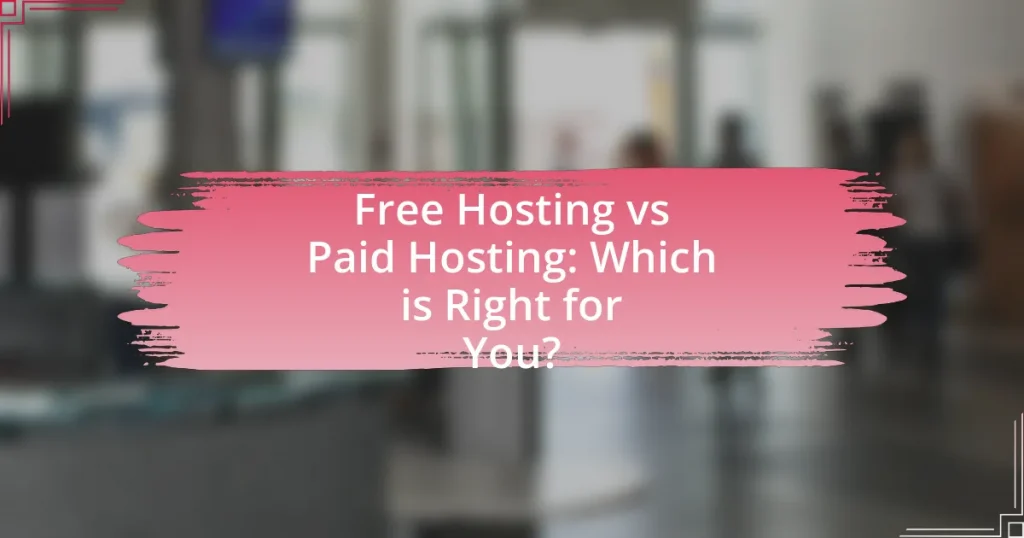The article examines the differences between free hosting and paid hosting, highlighting their respective features, advantages, and limitations. Free hosting offers cost savings but often comes with restricted resources, limited support, and potential performance issues, making it suitable for personal projects or small websites. In contrast, paid hosting provides enhanced performance, reliability, and customer support, making it ideal for businesses and resource-intensive applications. The article also discusses factors to consider when choosing between the two options, including website purpose, scalability, and customer support, while addressing common misconceptions and hidden costs associated with each hosting type.

What is Free Hosting and Paid Hosting?
Free hosting is a service that allows users to host their websites without any cost, typically supported by advertisements or limited features. In contrast, paid hosting requires users to pay a fee for enhanced services, including greater storage, bandwidth, and customer support. According to a 2021 survey by HostingAdvice, 70% of users prefer paid hosting for its reliability and performance, highlighting the trade-offs between cost and quality in web hosting options.
How do Free Hosting and Paid Hosting differ?
Free hosting and paid hosting differ primarily in terms of features, reliability, and support. Free hosting typically offers limited storage, bandwidth, and lacks customer support, while paid hosting provides more resources, enhanced performance, and dedicated technical assistance. For instance, free hosting services often display ads on user websites and may impose restrictions on website functionality, whereas paid hosting allows for greater customization and control, ensuring a more professional online presence.
What are the key features of Free Hosting?
Free hosting typically offers features such as limited storage space, bandwidth restrictions, and basic customer support. These services often include advertisements on user websites, lack of a custom domain name, and minimal security measures. For instance, many free hosting providers limit storage to a few hundred megabytes and bandwidth to a few gigabytes per month, which can hinder website performance and scalability. Additionally, free hosting often lacks advanced features like SSL certificates and database support, making it less suitable for professional or business use.
What are the key features of Paid Hosting?
Paid hosting offers several key features that distinguish it from free hosting. These features include enhanced performance, which is achieved through dedicated resources such as CPU and RAM, ensuring faster loading times and better reliability. Additionally, paid hosting typically provides a custom domain name, allowing businesses and individuals to establish a professional online presence.
Security is another critical feature, as paid hosting services often include SSL certificates, regular backups, and advanced security measures to protect against cyber threats. Furthermore, paid hosting plans usually come with customer support, offering assistance through various channels like live chat, email, or phone, which is often lacking in free hosting options.
Scalability is also a significant advantage, as paid hosting allows users to upgrade their plans easily to accommodate growing traffic and resource needs. According to a study by HostingAdvice, 70% of users reported improved website performance after switching from free to paid hosting, highlighting the tangible benefits of these key features.
Why do people choose Free Hosting over Paid Hosting?
People choose free hosting over paid hosting primarily due to cost savings. Free hosting services eliminate the financial barrier associated with website creation, making them attractive for individuals and small businesses with limited budgets. According to a survey by HostingAdvice, 60% of users opt for free hosting to test their ideas or projects without incurring expenses. Additionally, free hosting often provides essential features that meet the basic needs of users, such as website builders and limited storage, making it a practical choice for those starting out.
What are the advantages of Free Hosting?
Free hosting offers several advantages, primarily cost savings, as it allows users to create and maintain a website without any financial investment. This is particularly beneficial for individuals or small businesses with limited budgets, enabling them to establish an online presence. Additionally, free hosting services often provide user-friendly interfaces and easy setup processes, making them accessible for beginners with little technical expertise. Many free hosting platforms also include basic features such as website builders, templates, and limited storage, which can be sufficient for personal projects or small-scale websites. Furthermore, free hosting can serve as a testing ground for users to experiment with web development before committing to paid services.
What limitations come with Free Hosting?
Free hosting typically comes with several limitations, including restricted bandwidth, limited storage space, and lack of customer support. These constraints can hinder website performance and scalability, as many free hosting services impose strict data transfer limits, which can lead to slow loading times or downtime during high traffic periods. Additionally, free hosting often offers minimal storage capacity, making it challenging to host larger websites or applications. Furthermore, users may encounter inadequate customer support, which can complicate troubleshooting and maintenance. Many free hosting providers also display ads on users’ websites, reducing professionalism and control over the site’s appearance.
What are the reasons to opt for Paid Hosting?
Paid hosting offers enhanced performance, reliability, and support compared to free hosting. Users benefit from faster loading times due to dedicated resources, which can improve user experience and SEO rankings. Paid hosting typically includes better uptime guarantees, often exceeding 99.9%, ensuring that websites remain accessible to visitors. Additionally, paid hosting services provide customer support, often available 24/7, which is crucial for resolving technical issues promptly. Security features, such as SSL certificates and regular backups, are also standard in paid hosting, protecting websites from data breaches and loss. These factors collectively make paid hosting a more robust option for individuals and businesses seeking a professional online presence.
What benefits does Paid Hosting provide?
Paid hosting provides enhanced performance, reliability, and support compared to free hosting options. Users benefit from faster loading times due to dedicated resources, which can improve user experience and SEO rankings. Additionally, paid hosting typically includes a higher level of uptime, often guaranteed at 99.9%, ensuring that websites remain accessible to visitors. Furthermore, paid hosting services offer customer support, often available 24/7, which is crucial for resolving technical issues promptly. Security features, such as SSL certificates and regular backups, are also commonly included, protecting websites from data breaches and loss. These advantages make paid hosting a more robust choice for businesses and individuals seeking a professional online presence.
How does Paid Hosting enhance website performance?
Paid hosting enhances website performance by providing dedicated resources, faster loading times, and improved reliability. Unlike free hosting, which often shares server resources among multiple users, paid hosting allocates specific bandwidth, storage, and processing power to each website. This results in quicker response times and the ability to handle higher traffic volumes without slowdowns. Additionally, paid hosting typically includes advanced features such as Content Delivery Networks (CDNs) and optimized server configurations, which further boost performance. Studies show that websites on paid hosting can load up to 50% faster than those on free platforms, significantly improving user experience and search engine rankings.

What factors should you consider when choosing between Free and Paid Hosting?
When choosing between Free and Paid Hosting, consider factors such as reliability, support, features, and scalability. Free hosting often lacks reliability due to limited resources and may include ads, while paid hosting typically offers better uptime and performance. Support is crucial; paid hosting usually provides 24/7 customer service, whereas free hosting may have minimal or no support. Features like storage, bandwidth, and security are often more robust in paid plans, allowing for better website functionality. Scalability is another important aspect; paid hosting allows for easy upgrades as your website grows, while free hosting may restrict growth potential.
How does your website’s purpose influence your hosting choice?
A website’s purpose significantly influences its hosting choice by determining the required resources, performance, and reliability. For instance, an e-commerce site necessitates a paid hosting plan to ensure high uptime, security, and fast loading speeds, which are critical for user experience and transaction success. In contrast, a personal blog may function adequately on free hosting, as it typically demands fewer resources and lower performance standards. Research indicates that 47% of users expect a webpage to load in two seconds or less, highlighting the importance of selecting a hosting option that aligns with the website’s purpose to meet user expectations effectively.
What types of websites are best suited for Free Hosting?
Websites that are best suited for free hosting typically include personal blogs, portfolios, small business sites, and hobbyist projects. These types of websites often have lower resource demands and do not require extensive features or high traffic capabilities. For instance, personal blogs can thrive on free hosting platforms like WordPress.com or Blogger, which offer basic functionalities without the need for advanced customization. Additionally, portfolios showcasing creative work can effectively utilize free hosting services to present content without incurring costs. Small businesses and hobbyist projects can also benefit from free hosting as they often start with limited budgets and can upgrade to paid hosting as their needs grow.
What types of websites require Paid Hosting?
Websites that require paid hosting typically include e-commerce sites, business websites, and sites with high traffic or resource-intensive applications. E-commerce sites need secure payment processing and reliable uptime, which paid hosting provides. Business websites often require custom domains, professional email accounts, and enhanced security features, all of which are standard in paid hosting plans. Additionally, websites with high traffic or those running complex applications, such as content management systems or databases, benefit from the increased bandwidth, storage, and technical support that paid hosting offers.
What is the importance of customer support in hosting choices?
Customer support is crucial in hosting choices because it directly impacts user experience and problem resolution. Reliable customer support ensures that users can quickly address technical issues, which is essential for maintaining website uptime and performance. For instance, a study by the American Express Global Customer Service Barometer found that 33% of customers would consider switching companies after just a single instance of poor service. This statistic highlights the importance of responsive and effective customer support in retaining customers and ensuring satisfaction in both free and paid hosting options.
How does customer support differ between Free and Paid Hosting?
Customer support significantly differs between free and paid hosting, with paid hosting typically offering more comprehensive and responsive support. Free hosting services often provide limited customer support, which may include basic FAQs or community forums, while paid hosting usually includes 24/7 access to professional support teams via multiple channels such as live chat, email, and phone. This difference is evident as paid hosting providers often guarantee faster response times and dedicated assistance, ensuring that issues are resolved promptly, which is crucial for businesses that rely on uptime and performance.
What support options should you look for in Paid Hosting?
In paid hosting, you should look for 24/7 customer support, multiple contact methods, and a knowledge base. 24/7 customer support ensures assistance is available at any time, which is crucial for resolving issues quickly. Multiple contact methods, such as live chat, email, and phone support, provide flexibility in how you can reach out for help. A comprehensive knowledge base offers self-service resources that can help users troubleshoot common problems independently. These support options enhance the overall reliability and user experience of paid hosting services.

What are the common misconceptions about Free and Paid Hosting?
Common misconceptions about free and paid hosting include the belief that free hosting is entirely sufficient for all website needs and that paid hosting guarantees superior performance without any drawbacks. Free hosting often comes with limitations such as bandwidth restrictions, lack of customer support, and potential security vulnerabilities, which can hinder website functionality. In contrast, while paid hosting typically offers better performance, reliability, and support, it can also involve hidden costs and varying service quality depending on the provider. Understanding these misconceptions helps users make informed decisions based on their specific requirements and budget.
Is Free Hosting really free?
Free hosting is not truly free, as it often comes with limitations and hidden costs. While the initial service may not require payment, users typically face restrictions such as bandwidth caps, storage limits, and mandatory advertisements. Additionally, many free hosting providers monetize their services through upselling premium features or collecting user data. For instance, a study by HostingAdvice found that 70% of free hosting services impose significant limitations that can hinder website performance and user experience.
What hidden costs might be associated with Free Hosting?
Hidden costs associated with free hosting include limited bandwidth, lack of customer support, and potential data privacy issues. Free hosting services often impose restrictions on data transfer, which can lead to additional charges if usage exceeds the limit. Additionally, these services typically do not offer reliable customer support, which can result in lost revenue during downtime. Furthermore, free hosting providers may monetize user data or display ads on hosted sites, compromising user privacy and potentially affecting site credibility. These factors collectively highlight the hidden costs that can arise from opting for free hosting solutions.
How do Free Hosting providers monetize their services?
Free hosting providers monetize their services primarily through advertising, upselling premium features, and data collection. Advertising involves displaying third-party ads on users’ websites, generating revenue based on impressions or clicks. Upselling premium features allows providers to offer enhanced services, such as increased storage or custom domains, for a fee. Additionally, data collection enables providers to gather user information for targeted marketing or sell aggregated data to third parties, further contributing to their revenue streams.
Are all Paid Hosting services worth the investment?
Not all paid hosting services are worth the investment. The value of a paid hosting service depends on factors such as performance, customer support, features, and reliability. For instance, a study by HostingAdvice found that 70% of users reported improved website performance with paid hosting compared to free options. Additionally, paid services often provide better security measures and uptime guarantees, which are crucial for business operations. Therefore, while some paid hosting services offer significant benefits, others may not justify their costs based on user needs and expectations.
What should you watch out for when selecting Paid Hosting?
When selecting paid hosting, you should watch out for hidden fees and renewal rates. Many hosting providers advertise low initial prices but may charge significantly higher rates upon renewal or for additional services, such as backups or SSL certificates. According to a 2021 survey by HostingAdvice, 70% of users reported being surprised by unexpected costs after signing up for hosting services. Additionally, evaluate the provider’s uptime guarantees and customer support responsiveness, as these factors directly impact website performance and reliability.
How can you determine the value of a Paid Hosting service?
To determine the value of a Paid Hosting service, evaluate its features, performance, customer support, and pricing relative to competitors. Features such as storage capacity, bandwidth, uptime guarantees, and security measures directly impact the service’s effectiveness for your needs. Performance metrics, including loading speed and server reliability, are critical for user experience and SEO. Customer support quality, including availability and responsiveness, influences how quickly issues can be resolved. Pricing should be compared against similar services to ensure you receive adequate value for the cost. For instance, a study by HostingAdvice found that services offering 99.9% uptime and 24/7 support typically justify higher price points due to their reliability and service quality.
What are the best practices for selecting the right hosting option for your needs?
To select the right hosting option for your needs, evaluate your website’s requirements, including traffic expectations, resource needs, and budget constraints. Assess the scalability of the hosting service, ensuring it can accommodate future growth, as many free hosting options lack this flexibility. Consider the level of customer support provided; paid hosting typically offers more reliable and responsive support compared to free services. Additionally, examine the security features offered, as paid hosting often includes better protection against threats. According to a study by HostingAdvice, 70% of businesses reported improved performance and security with paid hosting compared to free alternatives.
How can you evaluate your hosting needs effectively?
To evaluate your hosting needs effectively, first assess your website’s requirements, including expected traffic, storage, and performance needs. For instance, a website with high traffic and resource-intensive applications will require a robust hosting solution, such as a dedicated server or VPS, while a personal blog may suffice with shared hosting. Additionally, consider the level of technical support and security features offered by the hosting provider, as these can significantly impact your website’s performance and safety. According to a survey by HostingAdvice, 70% of users reported that customer support was a critical factor in their hosting decision, highlighting the importance of this aspect in your evaluation.















